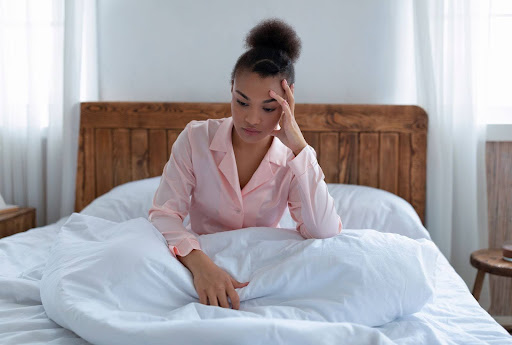Believe it or not, hormones and sleep cycles go hand in hand. Any time you go through hormonal changes related to pregnancy and menopause, you may notice sleep disturbances. Stress hormones, such as the stress hormone cortisol, may lead to sleep issues as well. Raleigh OB/GYN is here to dive deeper into how hormones may impact your sleep and what you can do to get a good night’s sleep every night.
Estrogen
Estrogen is a female hormone that comes from the ovaries. While it’s typically linked to reproductive health, estrogen can also help your body increase bone formation and process serotonin, which is a chemical that carries messages between nerve cells in the brain through various parts of your body.
As you near menopause, your estrogen levels may decrease and, as a result, hinder your sleep. You may face common symptoms, like mood swings, hot flashes, and night sweats, that impair your ability to fall asleep and stay asleep.
Progesterone
Progesterone is another female hormone that is also produced by the ovaries. It can naturally reduce anxiety, help you fall asleep faster, and minimize sleep disruptions. Unfortunately, however, menstruation and menopause may cause progesterone levels to fall, often leading to anxiety and insomnia. The most common symptoms of low progesterone levels include mood swings, hot flashes, night sweats, and a low sex drive.
Hormonal Insomnia
When hormones, like estrogen and progesterone interfere with your ability to sleep well, you may face hormonal insomnia. You might find it difficult to fall asleep, wake up in the middle of the night, have trouble maintaining a regular sleep schedule, and experience fatigue, irritability, and/or concentration issues due to lack of sleep. While hormonal insomnia can be a frustrating condition, there are many ways to combat it and stop it from arising in the first place.
How To Improve Hormone-Related Sleep Issues
These tips may help you fall asleep and stay asleep, despite any hormone changes you may be experiencing.
1. Stick To A Regular Sleep Schedule
Consistency is important if you want to achieve and maintain a good night’s sleep, every night. That’s why you should commit to a regular sleep schedule. Wake up and go to sleep at the same time every morning and evening. Remember that waking up too early or sleeping in too much can hinder our sleep quality.
2. Reduce Distractions
While it may be tempting to surf the internet and scroll through social media at bedtime, doing so can prevent you from falling asleep. It’s a good idea to turn off your phone and television when you’re in bed. Instead, practice relaxing activities that will get you in the mood for bed, like taking a warm bath or listening to soothing music.
3. Limit Heavy Meals Or Alcohol Consumption
Heavy meals and alcohol can make you feel sleepy. However, they may also hinder your ability to stay asleep for a long period of time. If you do get hungry before bed, opt for a light, nutritious snack and glass of water instead. Schedule dinner and other meals more than three hours before bed.
4. Only Use Your Bed For Sleep
You should dedicate your bed to sleeping. Save your work for your desk and other activities for other places in and out of your house. When you reserve your bed for a good night’s sleep, you’re less likely to get distracted and more likely to fall asleep and stay asleep. Speaking of your bed, make sure it’s furnished with a comfortable mattress and in a dark bedroom with a good temperature.
Struggling with Hormone-Related Sleep Issues? Contact Raleigh OB/GYN
Raleigh OB/GYN is dedicated to helping you lead your healthiest life. If you’re coping with sleep problems as a result of hormones, please contact us today. We look forward to hearing from you!


